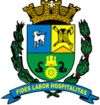Boituva
| Boituva | |||
|---|---|---|---|
| Municipality | |||
| |||
| Nickname(s): National Skydive Capital | |||
| Motto: Fides, Labor, Hospitalitas (Latin: Fidelity, Work, Hospitality) | |||
 Location in São Paulo state | |||
 Boituva Location in Brazil | |||
| Coordinates: 23°17′0″S 47°40′20″W / 23.28333°S 47.67222°WCoordinates: 23°17′0″S 47°40′20″W / 23.28333°S 47.67222°W | |||
| Country |
| ||
| Region | Southeast Brazil | ||
| State | São Paulo | ||
| Metropolitan Region | Sorocaba | ||
| Area | |||
| • Total | 248.97 km2 (96.13 sq mi) | ||
| Elevation | 637 m (2,090 ft) | ||
| Population (2015) | |||
| • Total | 55,725 | ||
| • Density | 220/km2 (580/sq mi) | ||
| Time zone | BRT (UTC-3) | ||
| • Summer (DST) | BRST (UTC-2) | ||
| Website |
boituva | ||
Boituva is a municipality in the state of São Paulo in Brazil. It is part of the Metropolitan Region of Sorocaba.[1] The population is 55,725 (2015 est.) in an area of 248.97 km².[2] The elevation is 637 metres.
It is known as the "National Skydive Capital". In Tupi, Boituva means "many snakes".
Short history
The first inhabitants that formed the settlement called at that time Boituva Fields, began settling here in the late 18th century according to official history.
Some scholars affirm that the pioneers of Boituva arrived by train, the former Sorocabana Railway. Others, however assert that the first inhabitants were ex-workers of the then extinct iron smeltery on Ipanema farm, thus closed, forcing them to acquire neighboring lands.
In the second or third decade Boituva gained fame – and is known until today – as The Land of Pineapple, since the first culture on a large scale was pineapple. The quality of the fruit was such that it was awarded a gold medal in a national level exposition, realized in São Paulo, thus emerging the Boituvana variety of pineapple.
The political-administrative emancipation of Boituva occurred on September 6, 1937, the date of which is now commemorated with the celebration known as Boituvana.
Hymn
(in Portuguese) (Music and lyrics by Roberto Resendo Camargo)
- No antigo bairro "Campo de Boituva", desbravadores chegando aqui
- Chamaram-te "Mboy-tuba" - muitas cobras, na lingua indígena tupí
- A terra abençoada e prometida da fé que faz a força do labor
- Da hospitalidade e o dom de bem servir
- Ao próximo com muito amor!
- (Chorus)
- Boituva, boituva, terra onde reside a paz...
- Quem chegou ficou, quem partiu chorou,
- E não te esquece nunca mais!
- O trem de ferro da "Sorocabana" fez o progresso chegar aqui...
- Na época a cidade criou fama com as lavouras do abacaxi,
- Depois o algodão e hoje a cana, são frutos do teu solo produtor,
- Uniram-se a industria e o comércio aos ideais do agricultor.
- (Chorus)
- As chácaras, o camping, as fazendas, os grandes haras, tudo isso faz
- Àqueles que procuram o aconchego, em teu sossego buscar a paz...
- O centro do civil paraquedismo, O polo do turismo e do lazer...
- Boituva nós sentimos ufanismo: é ótimo seu filho ser.
- (Chorus)
- O povo te dedica uma semana: a "Boituvana" que é tradição...
- A "Águia da Castelo" se engalana e te proclama com emoção.
- E ao comemorar seis de setembro, relembra teu passado triunfal,
- E faz do seu presente uma certeza:
- Que hoje és glória regional!
- (Chorus)
References
- ↑ "Governo do Estado de São Paulo, Lei Complementar nº 1.241, de 8 de maio de 2014". Archived from the original on 2014-10-18. Retrieved 2015-09-29.
- ↑ Instituto Brasileiro de Geografia e Estatística
External links
- (in Portuguese) Prefeitura Municipal (City Hall)
- (in Portuguese) Gazeta Boituvense
- (in Portuguese) Nosso Jornal

